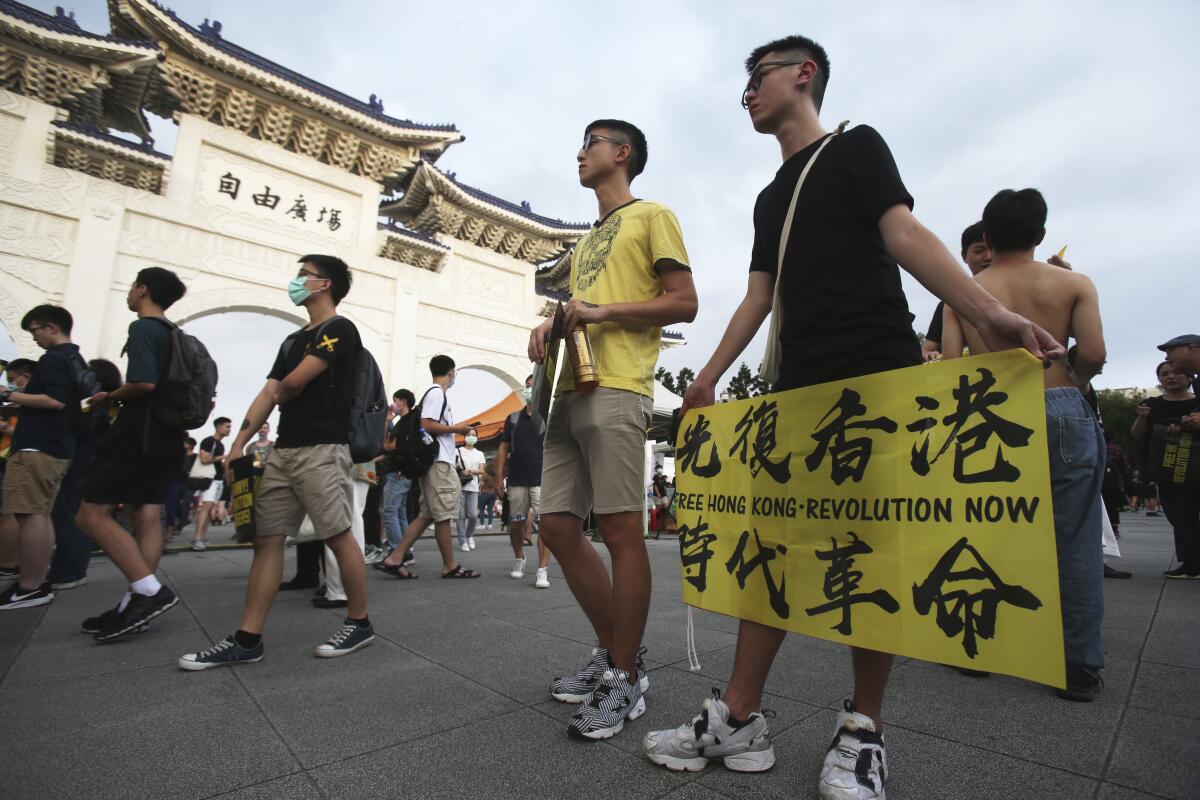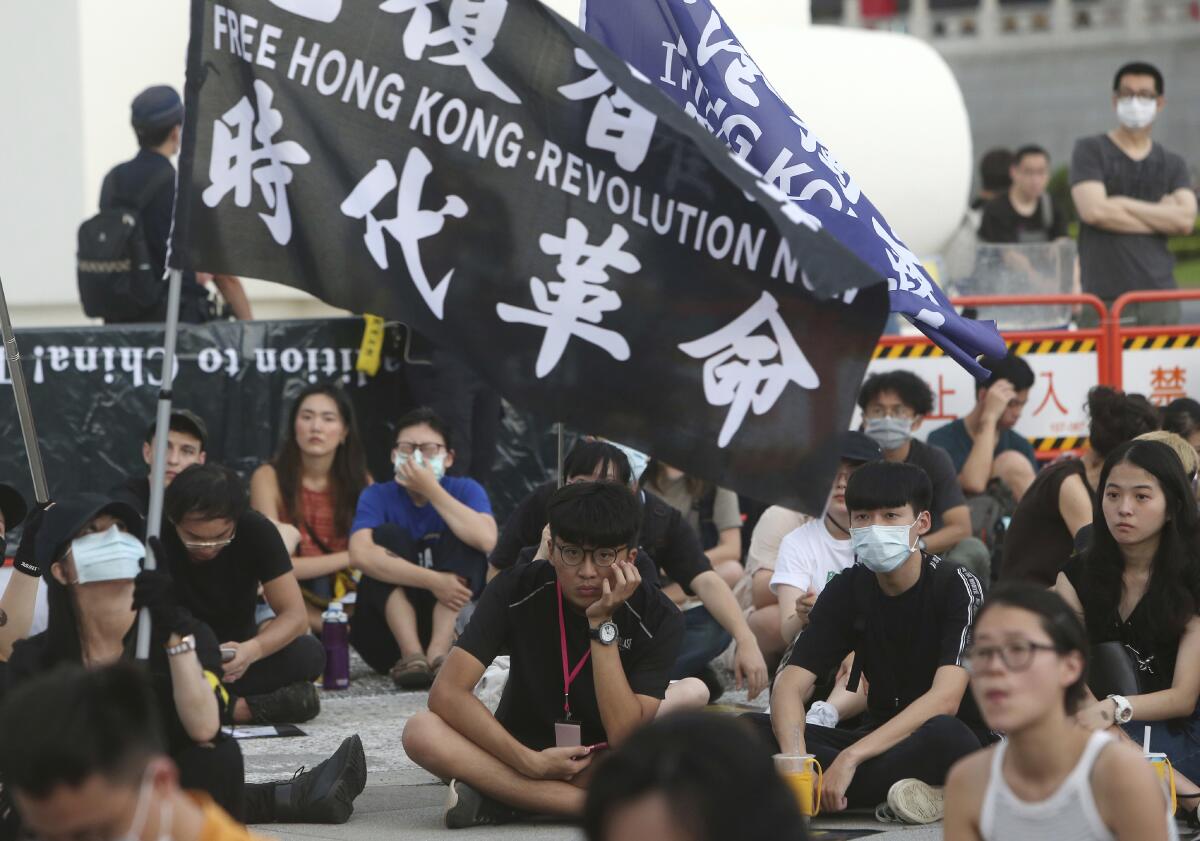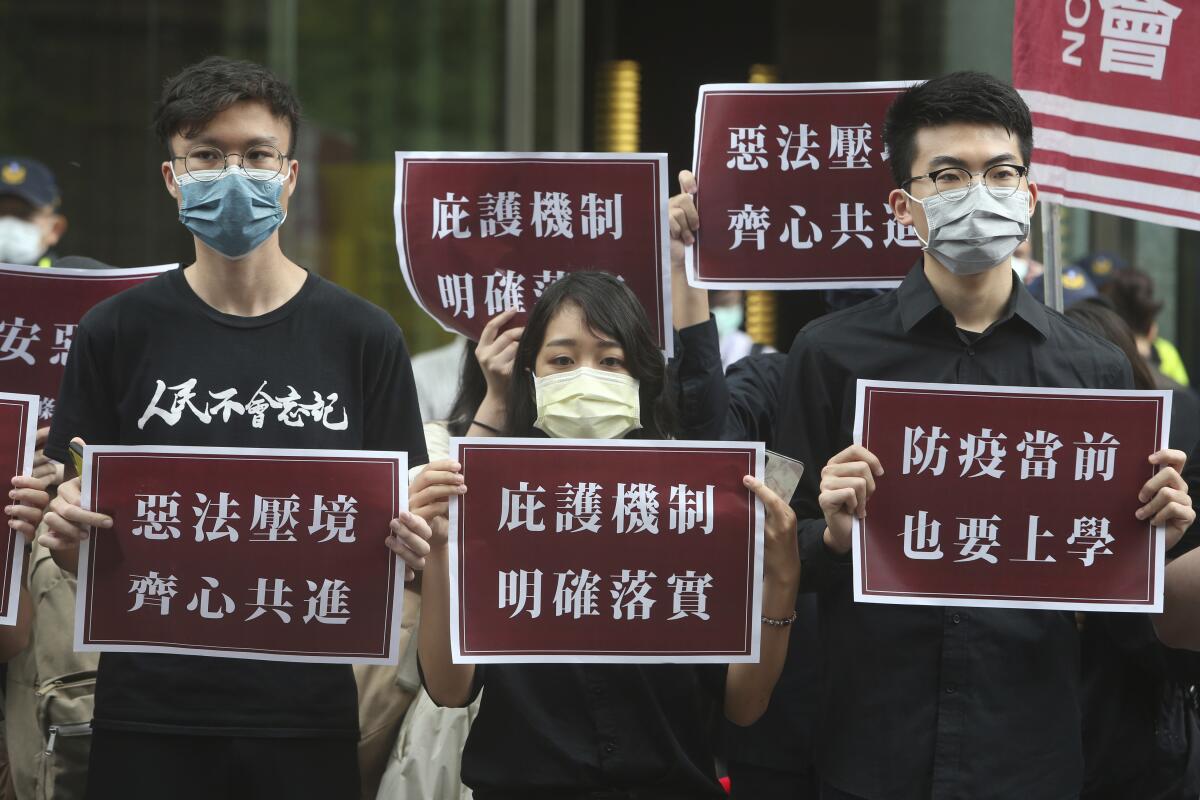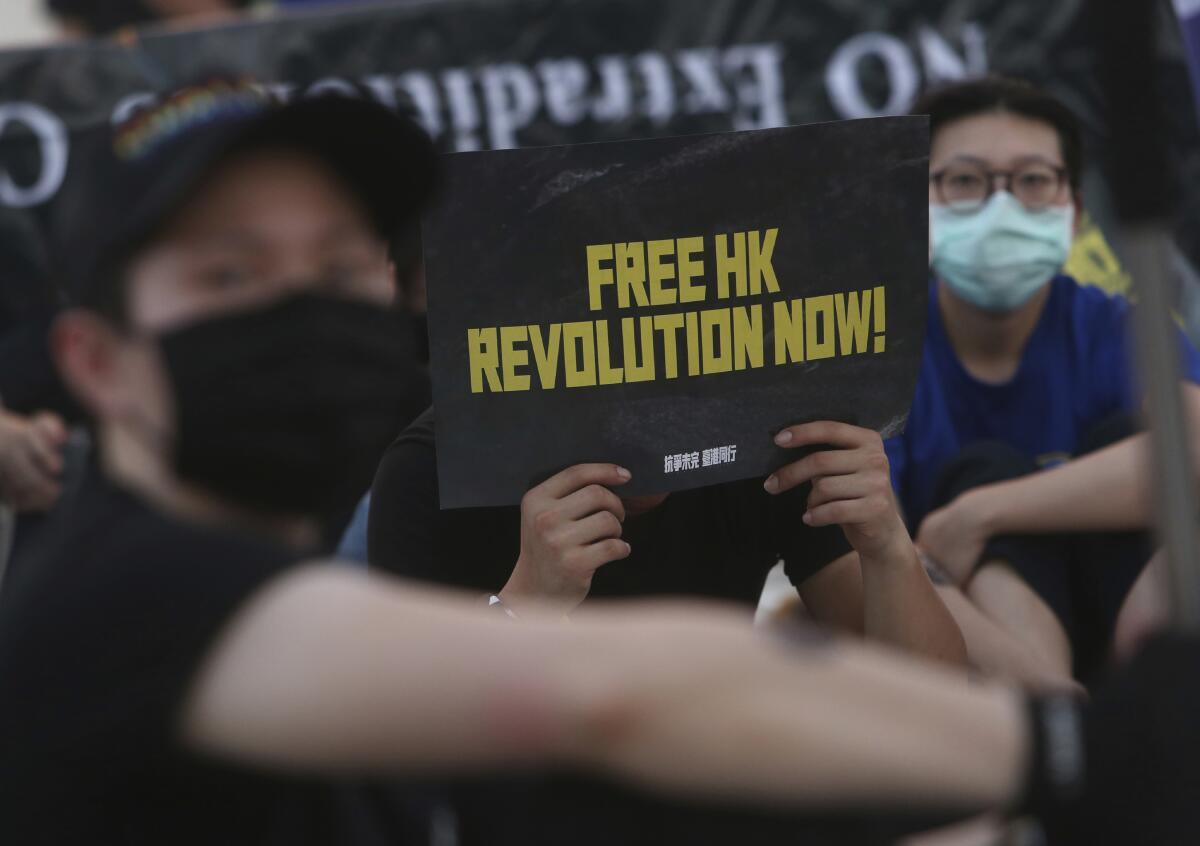As Beijing tightens its grip, Hong Kongers seek refuge in Taiwan

- Share via
TAIPEI, Taiwan — The slogans were the same, but they felt different in this foreign land, drifting through the air in a mix of Cantonese and Mandarin: “Five demands, not one less!” and “Free Hong Kong, revolution now!”
Protesters stood before the crowd, waving flags that read “Hong Kong independence” and wearing the same yellow hard hats and gas masks they’d worn back home to protect them from tear gas and police beatings.
But this wasn’t home. There was no police squadron waiting for them here, no need for live maps and warnings on encrypted chat groups, no fear of coming clashes late in the night -- only a disjointed sense of distance from the frontlines 500 miles away.
Solidarity rallies for Hong Kong’s pro-democracy movement have become common in Taiwan, especially as thousands of Hong Kongers, who unlike Taiwanese speak mostly Cantonese, resettle in this democratic island nation.
“I wish I could always stay in Hong Kong, but conditions there keep deteriorating,” said Connie Ng, 30, who often traveled to Taiwan for work and moved here last year because she felt safer. Many of her friends are still resisting back home, she said, but they were scared, and wondering how long they could endure mainland China’s threats to civil rights in Hong Kong.

More than 5,800 Hong Kongers moved to Taiwan in 2019 – an increase of more than 41% from the previous year. They arrived as 9,000 demonstrators were arrested in Hong Kong during mass anti-government protests against proposed legislation that would extradite criminal suspects to mainland China.
While some protesters vow to “stay and fight,” many Hong Kongers are now looking to escape as China accelerates its crackdown with plans in coming months to establish secret police, tighten national security and reform Hong Kong’s liberal education system.
More than 2,800 additional Hong Kongers relocated to Taiwan within the first four months of 2020, according to Taiwan’s National Immigration Agency. Taiwan’s government announced Thursday that a new agency, the Hong Kong Service and Exchange Office, would help Hong Kong “shelter seekers” with residency, housing, jobs and legal protections.
The office is set to open on July 1 and comes after a pledge from President Tsai Ing-wen in May to extend humanitarian assistance for newcomers.
Tsai’s promise reflects a swell in public support for Hong Kongers in Taiwan, which has no refugee law that could grant them asylum but can assist them if their safety and liberty are “immediately threatened for political reasons.”
“It’s hard to imagine that Hong Kong could have gone from a destination to a source of political refugees so rapidly,” said Leon, a former Hong Kong protester in his mid-20s who fled here and asked not to use his full name for protection.
Hong Kong has long been a city of refugees. For over a century and a half as a British colony, it received waves of asylum seekers fleeing the revolutions, invasions, civil wars and political purges of mainland China. Even after its handover to Chinese sovereignty in 1997, semi-autonomous Hong Kong, which is ruled by Beijing’s promise of “One Country, Two Systems,” believed its freedoms would endure.
Leon was born into that Hong Kong, a wealthy, stable, financial hub with little initial interference from Beijing. He remembers growing up proud to be Chinese, especially when Beijing hosted the 2008 Olympics. When pro-democracy activists held vigils on June 4 and marches on July 1 each year, Leon shrugged.
“It felt pointless,” he said. “Every time, they were just ignored by the government.”

Things began changing in 2014, when mass protests erupted over the mainland government’s denial of universal suffrage for Hong Kong. Leon was too young to participate but felt his own sense of “Chinese” identity shift as he watched as students not much older than him getting tear gassed in the streets. But nothing changed.
A renewed protest movement, however, drew an estimated 1 million peaceful protesters into the streets last year to oppose the proposed extradition bill. The sight made Leon proud that his people cared about something beyond “money in our pockets and food on the table.”
A week later, Leon, who had recently graduated and was working an entry-level job in sales, joined the protests. He was tear gassed, which only made him more determined to stay on the streets. Tensions escalated, with police calling protesters “cockroaches” and protesters cursing entire police families. Hired thugs began attacking opposition legislators and civil society leaders on the streets.
In November, after one of his friends was arrested, Leon decided to leave.
But Taiwan offered limited protection. The country -- which the Chinese Communist Party claims but has never controlled -- has been excluded from the United Nations since the 1970s and is not a signatory to the U.N. Refugee Convention. Public opinion polls show over 60% of Taiwanese support introducing a refugee law.
“It’s not about pro- or anti-Hong Kong. Everyone is pro-Hong Kong,” said Taiwan-based University of Irvine PhD candidate Lev Nachman, whose research focuses on social movements and political parties in Taiwan and Hong Kong.
A Taiwanese parliamentary task force established to advocate for Hong Kong last month inspired a rare moment of cross-party consensus, drawing over 40 legislators from across the usually bitterly divided political spectrum.

One legislator suggested that Hong Kongers could obtain Taiwan citizenship through military service. Even the Nationalist party, which has historically leaned toward unification with China and is perceived as conciliatory to Beijing, recently called on President Tsai, who has been defiant against China’s claims on her territory, to do more.
Jacob Lin, a lawyer who helped settle some 200 Hong Kong protesters in Taiwan, said Tsai’s reelection in January reassured many self-exiles who’d worried that they would not be welcome under a Nationalist government. He said he is confident of Taiwan’s “good intentions” to open pathways to residency based on work, study and economic qualifications.
But sheltering Hong Kongers is not solely Taiwan’s responsibility, he said: “It is the moral imperative for every free and democratic society.”
So far, only the United Kingdom has taken similar measures, offering a way to residency for up to 3 million Hong Kongers who already hold British National (Overseas) status -- an identity they had to register for prior to Hong Kong’s handover in 1997.
Exiles like Leon, who has enrolled in a postgraduate program in Taiwan and is looking for a job, say that leaving doesn’t mean giving up. It means survival and a chance to continue fighting for Hong Kong from the outside.
For generations, Hong Kong was celebrated as a safe harbor for freethinkers while Taipei was the capital of a one-party authoritarian state under the Nationalist Party, which took over Taiwan after losing a civil war against China’s Communist Party.
Taiwan survived decades of martial law and suppression of speech before slowly moving into democratization, education reform and ongoing efforts to confront its history through truth and reconciliation. Throughout that period, Taiwanese diaspora played a critical role through overseas pressure groups and publications that couldn’t have existed within Taiwan.
That’s the role Leon believed he and other exiles would play: forming a “first stop” in Taiwan for fleeing Hong Kongers to reassemble and plot strategies as pressure back home intensifies against the pro-democracy movement.
“We haven’t just run away and said goodbye,” he said. “We will always be Hong Kongers. We will always fight for our homeland.”
But he didn’t know when he would ever return.
Special correspondent Ho Kilpatrick reported from Taipei and Times staff writer Su from Beijing.
More to Read
Sign up for Essential California
The most important California stories and recommendations in your inbox every morning.
You may occasionally receive promotional content from the Los Angeles Times.











